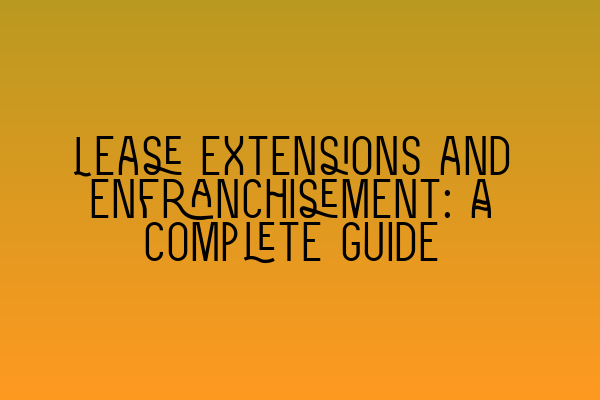Lease Extensions and Enfranchisement: A Complete Guide
When it comes to property law, lease extensions and enfranchisement are important concepts that tenants and freeholders should be familiar with. Whether you are a residential property owner looking to extend your lease or a freeholder seeking to enforce your rights, understanding the legal processes involved is essential. In this comprehensive guide, we will provide you with all the information you need to know about lease extensions and enfranchisement.
What is a Lease Extension?
A lease extension refers to the process of adding more years to the existing lease term on a property. As a leaseholder, extending your lease can offer significant benefits such as an increase in property value and peace of mind. Depending on the circumstances, you may be entitled to extend your lease under various legislations such as the Leasehold Reform, Housing, and Urban Development Act 1993 or the Commonhold and Leasehold Reform Act 2002.
To start the process of a lease extension, you will usually need to serve a Section 42 Notice on your landlord or the freeholder. This notice will include information about the proposed terms of the new lease, such as the length of extension and any changes to ground rent or other terms. It is important to consult a specialized property solicitor who can guide you through the legal requirements and negotiations.
For a more detailed understanding of the lease extension process, you can read our related article on SQE 1 Practice Exam Questions.
Enfranchisement: Buying the Freehold
Enfranchisement refers to the process of purchasing the freehold interest in your property, thereby owning both the building and the land it stands on. This can be an attractive option for leaseholders looking to gain greater control over their property and escape the limitations of leasehold ownership. The right to enfranchise is governed by legislation such as the Leasehold Reform Act 1967 and the Leasehold Reform, Housing, and Urban Development Act 1993.
There are specific criteria that need to be met in order to qualify for enfranchisement. For example, in some cases, the building must contain a minimum number of flats, and at least two-thirds of the leaseholders must participate in the process. Seeking professional advice from a property solicitor can help you determine if you meet the requirements and guide you through the enfranchisement process.
If you would like to test your knowledge on enfranchisement and other property law topics, take a look at our article on SQE 1 Practice Mocks FLK1 FLK2.
Benefits of Extending Your Lease or Enfranchisement
Extending your lease or enfranchisement can offer numerous advantages for both leaseholders and freeholders. Here are some of the key benefits:
- Increased Property Value: A longer lease term or owning the freehold can significantly increase the value of your property, making it more attractive to potential buyers.
- Financial Benefits: By extending your lease, you may avoid paying costly ground rent, service charges, or other fees associated with leasehold ownership.
- Greater Control: Enfranchisement allows leaseholders to have a say in how the building is managed, potentially leading to improved maintenance and communal facilities.
- Peace of Mind: Knowing that your lease has been extended or that you own the freehold can provide security and stability for both residential and commercial property owners.
Conclusion
Lease extensions and enfranchisement are essential processes for residential and commercial property owners to be aware of. Whether you are a leaseholder looking to extend your lease or a freeholder considering selling the freehold, understanding the legal requirements and procedures is crucial. By seeking professional advice from a property solicitor experienced in lease extensions and enfranchisement, you can ensure a smooth and successful process.
If you are interested in learning more about property law and preparing for the SQE exams, check out our related articles on SQE 2 Preparation Courses and SQE 1 Preparation Courses. Additionally, you can find the latest SQE exam dates on our website at SRA SQE Exam Dates.
